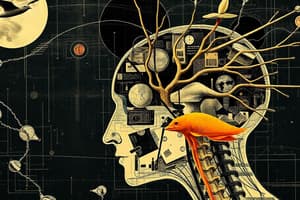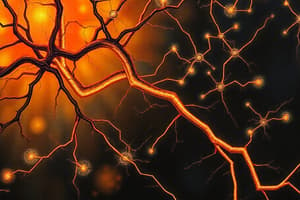Podcast
Questions and Answers
Which part of the brain is responsible for coordinating muscle movements and maintaining posture?
Which part of the brain is responsible for coordinating muscle movements and maintaining posture?
- Hypothalamus
- Medulla oblongata
- Cerebellum (correct)
- Frontal lobe
What is the primary function of the nervous system?
What is the primary function of the nervous system?
- Regulating and coordinating body activities (correct)
- Providing structural support for the body
- Generating energy for cellular functions
- Producing hormones for growth and development
What is the role of the endocrine system in coordination and control?
What is the role of the endocrine system in coordination and control?
- Breaking down food into nutrients for energy
- Producing antibodies to fight infections
- Releasing hormones to regulate bodily functions (correct)
- Filtering waste products from the blood
Which of the following is an example of a sensory neuron's function?
Which of the following is an example of a sensory neuron's function?
What is the primary function of the cerebellum in the coordination of movement?
What is the primary function of the cerebellum in the coordination of movement?
Which of the following hormones is NOT produced by the pituitary gland?
Which of the following hormones is NOT produced by the pituitary gland?
Flashcards
Cerebellum Function
Cerebellum Function
Coordinates muscle movements and maintains posture.
Nervous System Function
Nervous System Function
Regulates and coordinates body activities through electrical and chemical signals.
Endocrine System Role
Endocrine System Role
Releases hormones into the bloodstream to regulate various bodily functions.
Sensory Neuron Function
Sensory Neuron Function
Signup and view all the flashcards
Cerebellum's Role in Movement
Cerebellum's Role in Movement
Signup and view all the flashcards
Insulin Source
Insulin Source
Signup and view all the flashcards
Study Notes
Brain and Muscle Coordination
- The cerebellum coordinates muscle movements and maintains posture.
- It ensures smooth and balanced physical activity through motor control.
Nervous System Function
- The primary function of the nervous system is to transmit signals between different parts of the body, facilitating communication and response to stimuli.
Endocrine System Role
- The endocrine system regulates bodily functions by releasing hormones into the bloodstream, coordinating long-term processes such as growth, metabolism, and reproduction.
Sensory Neuron Function
- A sensory neuron functions by transmitting sensory information from receptors to the central nervous system for processing and response.
Cerebellum's Role in Movement
- The cerebellum is primarily responsible for the coordination of voluntary movements, balance, and motor learning.
Pituitary Gland Hormones
- Examples of hormones produced by the pituitary gland include growth hormone, thyroid-stimulating hormone, and adrenocorticotropic hormone; however, insulin is not produced by the pituitary gland.
Studying That Suits You
Use AI to generate personalized quizzes and flashcards to suit your learning preferences.




